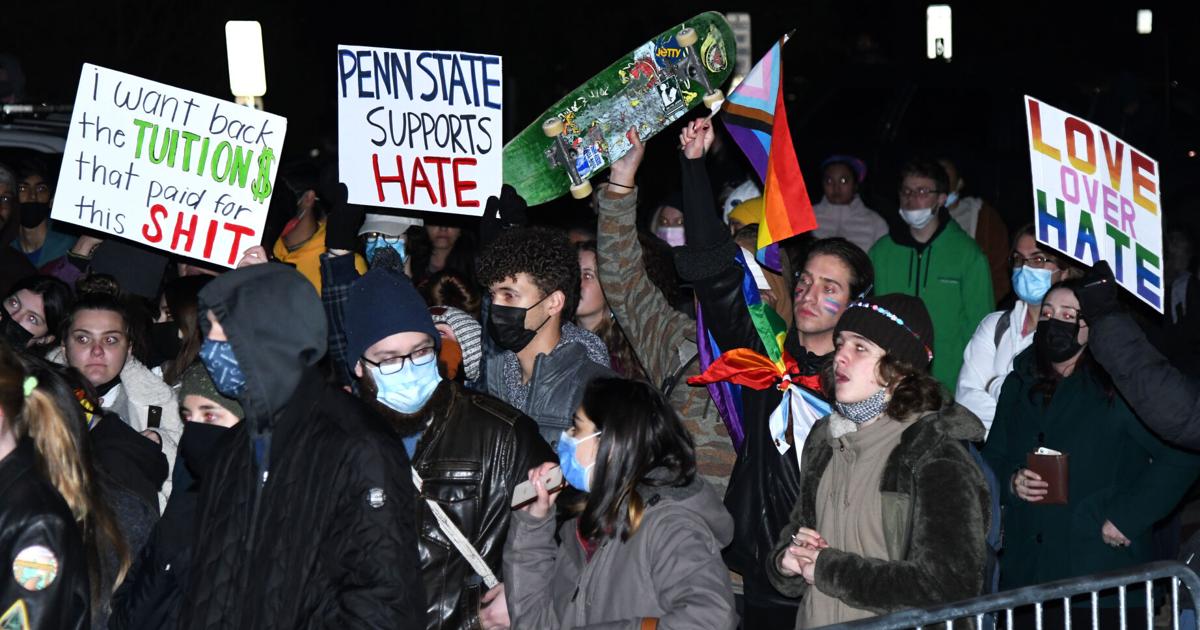
On April 27, Uncensored America’s Penn State chapter hosted a debate between Elijah Schaffer and Steven Bonnell.
The topic of the debate surrounded the war in Ukraine. The event, called “Ukraine is Evil,” showcased a debate between Bonnell and Schaffer, who was critical of the U.S. and Ukrainian governments.
The event was also livestreamed and filmed by the SOC 119 Live Stream Team, according to the YouTube video.
Uncensored America’s website describes the group as “a not-for-profit organization dedicated to fighting for freedom of speech.”
Uncensored America, founded in 2020, became well-known at Penn State last fall when it hosted Milo Yiannopoulos for a talk that was marketed as “Pray the Gay Away.”
It was an event that attracted protests, but everything remained peaceful.
In November 2021, Penn State said it wouldn’t cancel the event, as Uncensored America “has the undeniable Constitutional right to sponsor this presentation on [its] campus.”
The April 27 debate between Schaffer and Bonnell didn’t garner the same attention, yet Uncensored America was handed a bill that asked the group to pay upward of $1,800 for the security Penn State provided that night.
For a public university like Penn State to pose such a security fee is unconstitutional and threatens the First Amendment rights of its students.
In 1992, the U.S. Supreme Court affirmed this, in a 5-4 ruling in Forsyth County v. Nationalist Movement. The ruling determined that public officials can’t charge groups for security after the Nationalist Movement sued Forsyth County for enacting a security fee in addition to a permit fee when the group was planning its protest against the federal holiday honoring Martin Luther King Jr.
If Uncensored America doesn’t pay the fee, the organization’s bank account will be frozen, and it won’t have money to host speaking events, according to Uncensored America’s tweet.
Penn State has targeted a group based on the content of its speech.
As a nonprofit organization, just like most student organizations are, Uncensored America is not in a position to pay hefty security fees for every event.
Nothing about this is fair. If this becomes a trend, Penn State will effectively be axing certain groups from campus solely based on an expectation of disruption from students opposed to the group.
This puts student organizations at the whim of students who feel threatening violence is an acceptable response to speakers they find offensive.
Campuses such as Penn State’s should be sites where ideas are allowed to flow freely. Organizations should have the right to invite speakers without being bullied by the university.
Penn State needs to address this now — a billion-dollar university should be able to cover a security fee that’s not even $2,000.
Penn State is bound to protect the rights of every student, not just the ones the majority of the student base agrees with. Not just the ones the university administrators agree with. Every single one.
This isn’t about whether the views expressed by some of Uncensored America’s speakers are valid; it’s about a public university not having the power to dictate who’s free and who isn’t.
We have seen universities across the country crack down on free speech in recent years. Many of these universities were once stalwarts in the fight for free speech, which makes some of the new trends so troubling.
Universities have caved to activist groups who won’t be satisfied without complete submission. University presidents and other bureaucrats have ended up with the power to stifle expression on their campuses, even if the actions they have taken are unconstitutional.
Fringe ideas have always offended people. Sometimes, these ideas are complete nonsense, but on other occasions, we see fringe ideas go on to become the majority opinion.
Nobody, especially the government, should have the power to determine which ideas are acceptable and which aren’t.
For the most part, Penn State has respected the rights of its students. The bill given to Uncensored America seems to be an exception, but it’s problematic nonetheless.
As free speech has come under attack, too many universities haven’t done enough to defend it.








